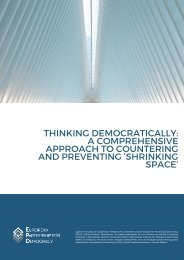Repression and resilience: Diagnosing closing space mid-pandemic
You also want an ePaper? Increase the reach of your titles
YUMPU automatically turns print PDFs into web optimized ePapers that Google loves.
42 REPRESSION AND RESILIENCE: DIAGNOSING CLOSING SPACE MID-PANDEMIC<br />
the lockdown.<br />
The executive undermined the fair political playing field by unevenly enforcing COVID measures. Where political<br />
meetings of the ruling party could take place undisturbed, opposition parties <strong>and</strong> civil society were violently disrupted<br />
by the police - even if they were observing social distancing measures <strong>and</strong> wearing masks. During one annual march,<br />
the SabaSaba, over 65 protestors were arrested <strong>and</strong> others dispersed aggressively by the police.<br />
As before the p<strong>and</strong>emic, the Courts <strong>and</strong> civil society organisations were the main defenders of democratic <strong>space</strong><br />
during the p<strong>and</strong>emic, greatly aided by media investigations. In March 2020, civil society was quick to adapt <strong>and</strong> provide<br />
necessary services to the most vulnerable in society. Civil society’s quick mobilisation efforts <strong>and</strong> frontline work to<br />
protect vulnerable populations activated informal community support networks, <strong>and</strong> reinforced democratic vitality<br />
at the local level in unprecedented ways. Civil society also monitored the impact of the p<strong>and</strong>emic <strong>and</strong> police brutality,<br />
challenged the constitutionality of a number of restrictions in court <strong>and</strong> received progressive rulings, compelling the<br />
government to abide by its human rights obligations <strong>and</strong> also providing meaningful precedents for this period.<br />
As legislative <strong>and</strong> procurement processes became less transparent, civil society petitions for access to information <strong>and</strong><br />
journalistic investigations into the use of COVID-19 funds provided essential avenues for accountability. Investigative<br />
journalists uncovered major cases of mismanagement of COVID-19 funds, showing that dubious tendering processes<br />
for medical products ended up filling the pockets of a corrupt elite, rather than alleviating the hardships of citizens.<br />
This caused major public outrage on an unprecedented scale. Kenyans’ outrage on social media eventually led to<br />
investigations <strong>and</strong> significant suspensions in the Ministry of Health.<br />
The judiciary remained a bastion of independence, but it was also subjected to significant attacks by the executive,<br />
with budget cuts, the failure by the executive to appoint 41 judges, <strong>and</strong> the failure of the executive to transfer tribunals<br />
previously under government ministries into the judiciary - thereby contravening the constitution. The p<strong>and</strong>emic also<br />
limited the population’s access to justice, as the justice system was temporarily paralysed by the p<strong>and</strong>emic measures.<br />
While the government imposed limitations on freedom of movement <strong>and</strong> assembly, no state of emergency was<br />
imposed. The Senate was quick to react <strong>and</strong> continued to play a strong oversight role, even as the National Assembly<br />
was limited in its activities. More broadly, the opposition was fragmented following a rapprochement between the main<br />
ruling <strong>and</strong> opposition party, thereby limiting the legislature’s effectiveness.<br />
Indonesia<br />
In Indonesia, the attacks on democratic <strong>space</strong> were very similar before <strong>and</strong> during the p<strong>and</strong>emic, but intensified<br />
over the course of the crisis <strong>and</strong> saw the military take a central role in public affairs. As Indonesia declared a state<br />
of emergency, it placed its four military institutions at the forefront of the p<strong>and</strong>emic management. The military<br />
supervised the implementation of health protocols <strong>and</strong> patrolled the streets across the country, greatly increasing<br />
military presence in the public sphere. In a country with a history of military rule, the p<strong>and</strong>emic <strong>and</strong> the resulting health<br />
emergency provided the ruling party with an opportunity to legitimise the military’s re-entry into non-military activities.<br />
The army was also involved in monitoring media <strong>and</strong> social media, <strong>and</strong> developing a drug against COVID-19. Such<br />
military presence everywhere had a great deterrent effect on civil society <strong>and</strong> activism.

















